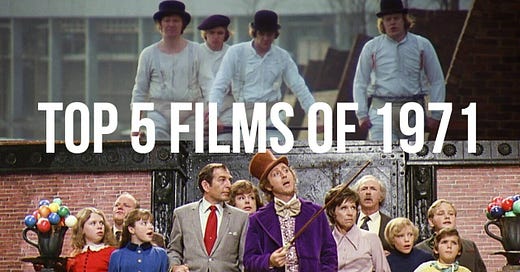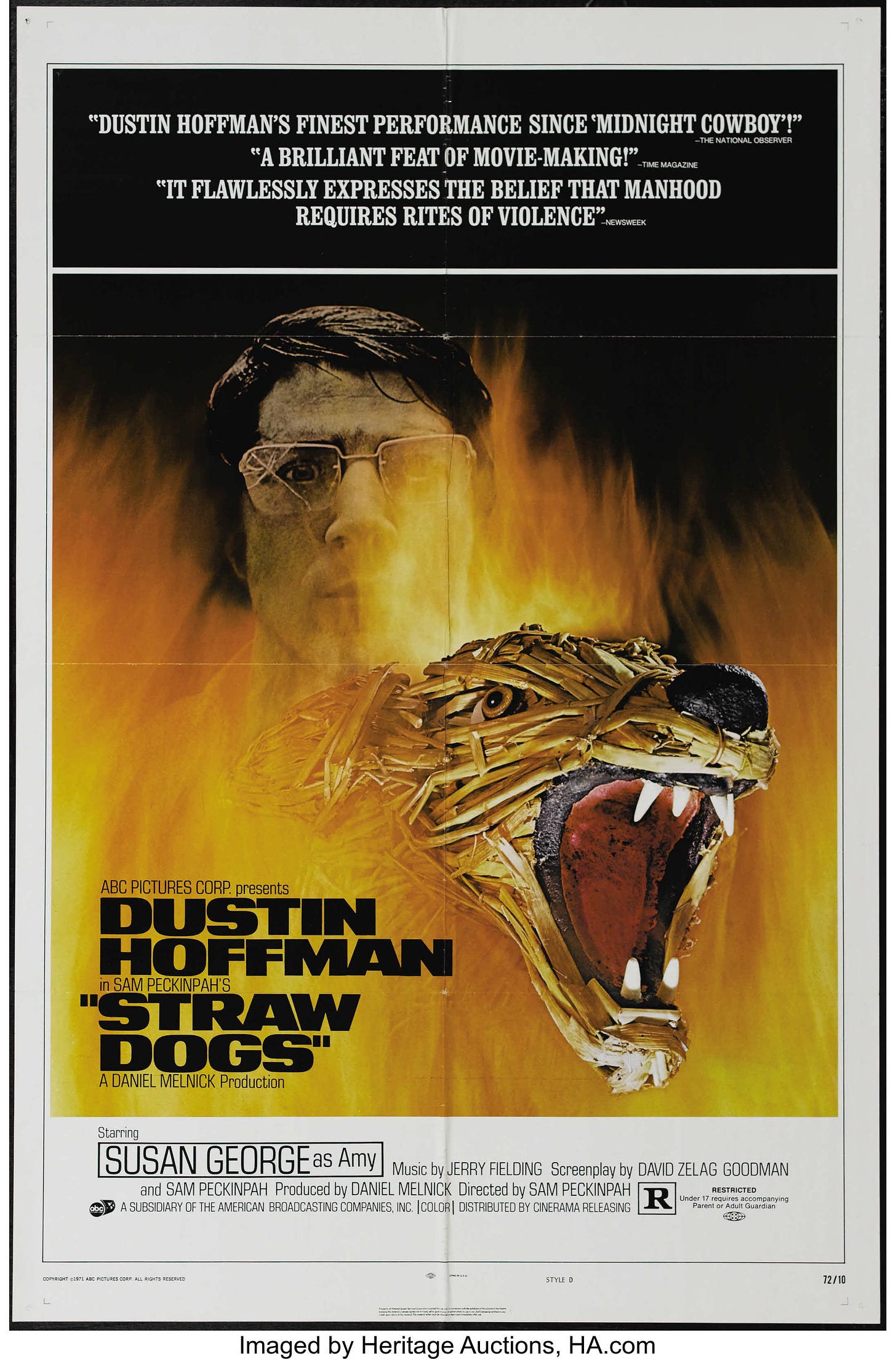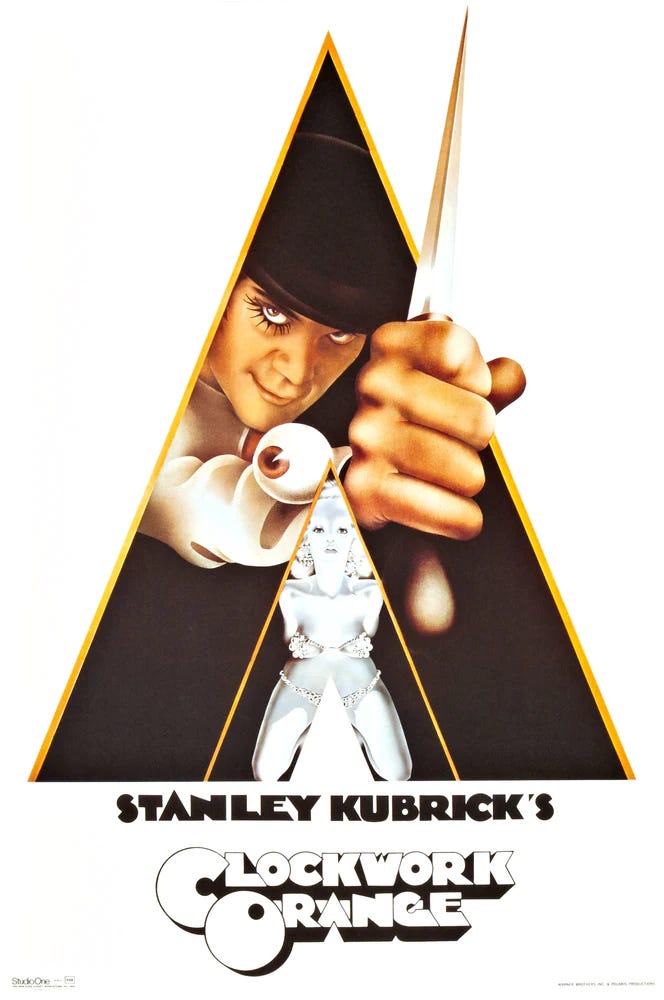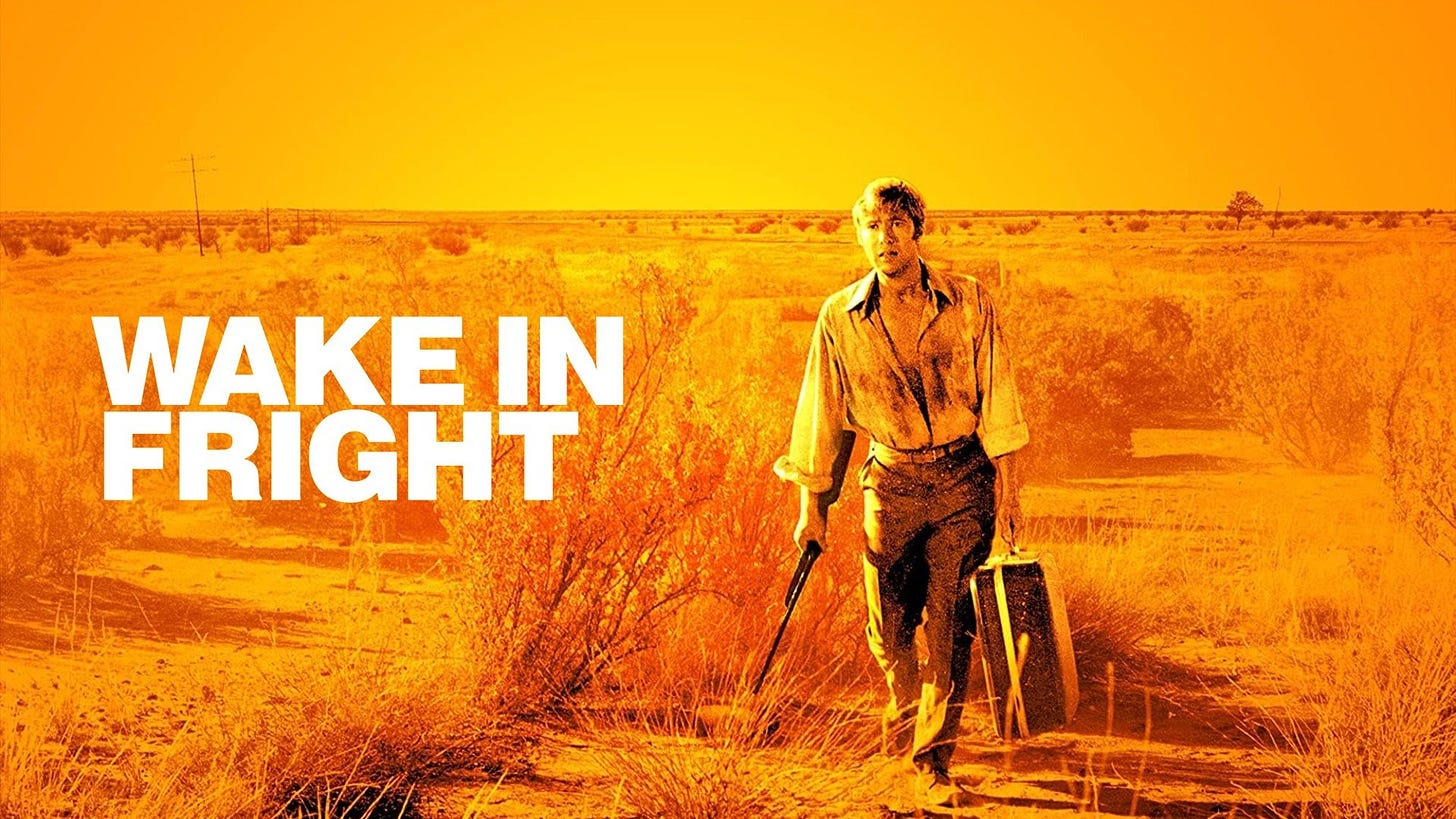Favourite Films of 1971
Monday is movies. And today it's a Top 5 list. My favourite Films of 1971. The potential start of an ongoing series...
Oscar has been obsessively asking me to list my favourite films of each year – it has been giving me flashbacks to me asking my parents the same sort of question, pursuing that line at least. I was probably asking them, over and again, to name their Top 5 Beatles albums, or songs. Or maybe I was asking them to name their Top 5 Willard Price Adventure Novels.
I should be proud of him for this. And though, I ultimately admitted to the blame/acknowledged the inability for the apple to roll very far from the tree, I’m also struggling to remember some of the years in cinema. And so we’ve been Googling lists of films from each year, and ranking them.
We started at 1970 – and I found that year really hard. Obviously there were classic films starting to show up (M*A*S*H, Patton, Ryan’s Daughter etc). But it wasn’t a big year for me. Nothing too memorable there. I like Love Story, as much for its Francais Lai score. I like Five Easy Pieces. And of course, I like M*A*S*H – though it was the TV show that meant a whole lot more for me.
1971 is the first true golden year for me when it comes to movies. From time to time here, I might pick a year and go through my Top 5 movies. And I thought I’d start with the year that cinema truly got gritty. (Again, for me, at least).
My obsession with the films of the 1970s kicked in on the back of watching a lot of Scorsese and Woody Allen movies; what else was happening then and there? It was the rise of the “Big” directors: George Lucas and Steven Spielberg, Robert Altman, Francis Ford Coppola, Marty, Woody, Hal Ashby, Walter Hill, Terence Malick, William Friedkin, Brian De Palma, Peter Bogdanovich – and many more. Big name directors Oliver Stone and Paul Schrader really broke big in the eighties, but were contributing scripts in the seventies, finding their feet with their early attempts to direct too.
It was the rise of the auteur – the film director taking the power back from the producer, studio, and the star. The best book you could ever read about this is Easy Riders, Raging Bulls: How the Sex-Drugs-and-Rock 'N Roll Generation Saved Hollywood which was also then turned into a 2003 documentary film.
The book had me going through the filmographies of Ashby and Malick and Friedkin and Schrader and Bogdanovich and checking out the earliest works of Spielberg and Lucas and Scorsese and so on…
Anyway, today, I’ll list for you (and me) my favourite films of 1971. In no particular order, here is my top five from the year when cinema really lit up.
Directed by Sam Peckinpah, starring a young Dustin Hoffman (and Susan George), Straw Dogs is controversial for its prolonged rape scene – and its visceral, violent, real-life horror won’t be for everyone (nor should it). I loved this film when I first saw it, and it’s held up for me (though, as with so many remakes, there’s no reason to watch the 2011 attempt to ‘update’ this). Straw Dogs is a type of man-alone, home-invasion horror that is almost its own genre, and one that has weakened with time. But to watch this is to be reminded of a distinct type of moral panic and gritty, grim intensity.
There’s really nothing quite like A Clockwork Orange, and I feel I can say this – having watched the film for the first time in many years just last week. In Wellington, in the mid-90s, this was a staple of the cinema – you went to a screening of Clockwork Orange as a treat on a Sunday night. And it was still shocking. Kubrick made better films, sure, but he only ever explored the impact and effects of violence in a deeper tone than this with 1987’s Full Metal Jacket. I love the way Kubrick films talk to one another though – this shares links with The Shining (music) and even Eyes Wide Shut (cults/groups) and it still seems surprising over 50 years later, and I must have watched this film close to a dozen times now.
This is the film that made me realise that Gene Hackman is one of the greats. Growing up, I saw him in decent (and sometimes brilliant) movies in the 80s and 90s, but it was going back to the start of his brilliance that truly convinced me. For that, this film is worthy. But it’s also a great William Friedkin, erm, vehicle – and that car chase! A classic neo-noir action-thriller.
Speaking of classic neo-noir action-thrillers, Dirty Harry is the start of five films featuring the titular character (Clint Eastwood). In the 90s, I became obsessed with Eastwood. Here was someone who wrote, directed, created soundtracks, and acted – but he had been reduced to some sort of laughing stock; the idea being that he was a clichéd action-hero/tough-guy. Nothing wrong with that when it’s done well. Not everything he’s made stands up, not every role he’s played has three-dimensions, but his best work is up there with anyone’s – and I think of Eastwood as being a bit like Stephen King, someone that gets laughed at for being prolific when instead, if we look at the best things we should simply marvel. The mood of Dirty Harry (its sublime score by Lalo Schifrin, deft direction by Don Siegel) elevates it. Yes, it’s a rogue cop story – but it’s got the good grit.
If Dirty Harry and The French Connection are somewhat linked, then Wake in Fright is arguably connected to Straw Dogs. But the daytime horror here, is around a man being out of his home, away from home, lost and drifting in a strange place. Wake in Fright is barbaric. And when I first saw it was blown away. I still feel like it’s one of cinema’s truly unique films. And many years after seeing it I decided to read its source material (a 1961 Australian novel of the same name). And that was very good also. The film continues to intrigue, appal and delight in equal measures for me.
And here’s five notable mentions – again in no particular order:
Sweet Sweetback’s Baadasssss Song
If we’re talking auteur, we have to consider this as a prime example. This blaxploitation gem was written, edited, scored, produced, and directed by Melvin Van Peebles. Oh yeah, he’s also the star.
Bananas
Classic Woody Allen wind-up stuff; one of the early, funny films…
Klute
More great neo-noir. Take the grit of French Connection and Dirty Harry and do something the rest of this list seems incapable of – integrate a female character for the main point of view. Breakout performances by both Jane Fonda and Donald Sutherland. Amazing mood to this film.
Carnal Knowledge
Mike Nichols had been pushing comedy to dark, intriguing places with Who’s Afraid of Virginia Woolf? and then The Graduate. Here, he ditches comedy altogether and goes really dark with this lustful tale. Jack Nicholson delights of course. As does Ann-Magaret, Rita Morena and Candice Bergen. Carol Kane is in there too. But the acting highlight for me is Art Garfunkel. He could really do it. And a couple of films really showcase that. Carnal Knowledge is a grim drama – and I love it.
Willy Wonka & The Chocolate Factory
As a kid I had no idea that the film was from 1971 – nor that the book was from earlier. They were both just products of the 1980s as far as I was concerned, since that’s when I consumed them. I always loved Gene Wilder, in this and other movies, but watching this more recently I realise what a truly virtuoso performance this was, the perfect take on Wonka.
So that’s my list of 1971 gems. A starting point at least.
Anything there you’ve also loved? Or anything you’d include instead?











That’s a cracker list. I saw them all on original release and often since.
So weird. On a whim I watched The French Connection over the weekend - first time since the ‘70’s, and then saw this article! Loved Popeye Doyle so much that I was going to watch the sequel but Ebert’s review suggested I give it a swerve. Will have to go back and revisit some of these other titles now.